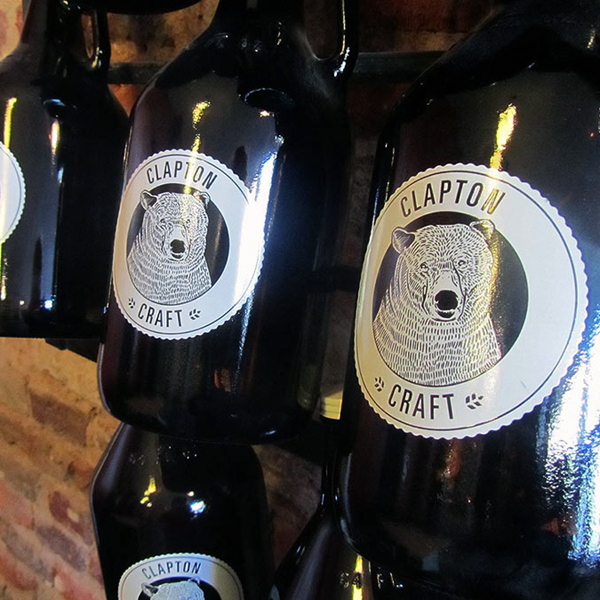North Carolina Brewery Wicked Weed Ventures into Natural Wine with Vīdl
Experimental, natural wines made by a team of former-brewers

Brewers do not view winemakers as the opposition; rather they see often wine as an area for experimentation. Some breweries mix grape juice into their beer, producing a hybrid offering that boasts qualities of both. Others rely on the flavors wine leaves behind, storing beer in leftover barrels for added flavor and textural development. North Carolina-based brewery Wicked Weed (known best for its barrel-aged sours) has dabbled in both of these processes since their inception. But instead of tiring out their beer audience with wine-based experiments, they’ve unexpectedly expanded into the natural wine category. Their operation, called Vīdl, launched its first few iterations earlier this year.

Using grapes grown exclusively in Yakima Valley, Washington—where Wicked Weed sources its hops—Vīdl’s head winemaker, Jen Currier (formerly Wicked Weed’s barrel and blending expert) crafted three unique wines available by the bottle or on tap at one of the conglomerate’s handful of drinking establishments.
They offer a Sauvignon Blanc—an unfiltered, mixed-fermentation wine with notes of pineapple and passionfruit, and then a farmhouse-ish funk, geranium, peach and honey. It’s not overly acidic and carries with it the ideal salinity. There’s also a Blaufränkisch—an unfiltered, native-fermented, rich red wine that balances the freshness of a lighter, fruitier wine with the old-oak and leathery Brettanomyces (Brett, in shorthand) notes predominantly found in dark, late-harvest wines.

Their third original release, the Contact Rosé, proves similarly surprising. A hybrid orange/rosé wine, this is a blend of Sauvignon Blanc and Tempranillo. In the end, it’s undoubtedly guava-forward. We’d argue, in the absence of a bottle label or the proper presentation, one could be tricked into believing it’s fresh-pressed juice, not a 49-day maceration wine made in North Carolina. Though some purists may balk at such a claim, it’s the company’s willingness to experiment that will separate their wines from others.
“When we opened, we really wanted to put our stamp on the craft beer world. I think if you look at the history of the company and what we achieved in that period of time, we really got a chance to have a big voice. And show people what we thought of beer,” Wicked Weed founder Walt Dickinson tells us. Wicked Weed’s popularity boomed, prompting an acquisition by Anheuser-Busch in 2017. Many view Wicked Weed as anti-establishment (at least in style) and were soured by the news, but it never slowed their mission: to offer adventurous beers—and now wines.

“Sour beers, barrel aging, wood aging, fruit fermenting and mixed culture fermentation played a huge role in building the backbone of what we do here. And as that journey went on, over time, we moved into a bigger facility. That was when I first met Jen,” Dickinson continues. He’d long considered expanding into cider (citing his love for those made in Basque-style) and then wine—in that order. As time passed, he felt their first forays were overdue. “It was all kind of bubbling together. It was something that I had been really passionate about wanting to do, and trying to find a place for… Then I kind of just decided it was the moment. Like, ‘Well, why not do this?’ We have the team; we have the capabilities. I’ve got somebody, Jen, who I really trust to drive the brand in the right direction and create things that I think reflect the kind of inspiration that we want to showcase, how we kind of attack flavor.”
 Vīdl’s wines boast vivacious flavor. They’re juicy, somewhat tart, bright and begging to be sipped. This stems from Currier and Dickinson’s knowledge of beer, and how the specific elements of a beverage encourage another sip. The two know when to add Brett to a wine—a no-no for many, Currier explains—to add body; when to skip it to emphasize its fruity flavors; and how to craft an arguably obscure liquid worth inspecting several times over.
Vīdl’s wines boast vivacious flavor. They’re juicy, somewhat tart, bright and begging to be sipped. This stems from Currier and Dickinson’s knowledge of beer, and how the specific elements of a beverage encourage another sip. The two know when to add Brett to a wine—a no-no for many, Currier explains—to add body; when to skip it to emphasize its fruity flavors; and how to craft an arguably obscure liquid worth inspecting several times over.
“One thing that remains really important to us is to make beers that are from here, and that taste like here. For the most part, everything that we’re adding into our beers is local,” Currier tells us about the production dichotomy. “Whereas for all of our wines, we might use a local grape to create a natural wine in the future but we’re really working hard to source these grapes to bring new life into the cellar.”
Wicked Weed enthusiasts may recognize a residual undertone within these three wine releases, but there is no lingering beer essence, per se. Though experimental and new, Vīdl is an increasingly vital player in the US natural wine landscape.
Images courtesy of Vīdl












